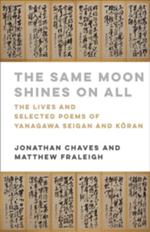Yanagawa Seigan (1789-1858) and his wife Koran (1804-79) were two of the great poets of nineteenth-century Japan. They practiced the art of traditional Sinitic poetry-works written in literary Sinitic, or classical Chinese, a language of enduring importance far beyond China’s borders. Together, they led itinerant lives, traveling around Japan teaching poetry and selling calligraphy. Seigan established Edo-period Japan’s largest poetry society and attained nationwide renown as a literary figure, as well as taking part in stealthy political activities in the years before the Meiji Restoration. Koran was one of the most accomplished female composers of Sinitic poetry in Japanese history. After her husband’s death, she was arrested and imprisoned for six months as part of a crackdown on political reform. Seigan and Koran’s works at once display mastery of a poetic tradition and depict Japan on the brink of monumental change.

The same moon shines on all
ISBN: 9780231213714
Format: Paperback
Publisher: Columbia University Press
Origin: US
Release Date: August, 2024


